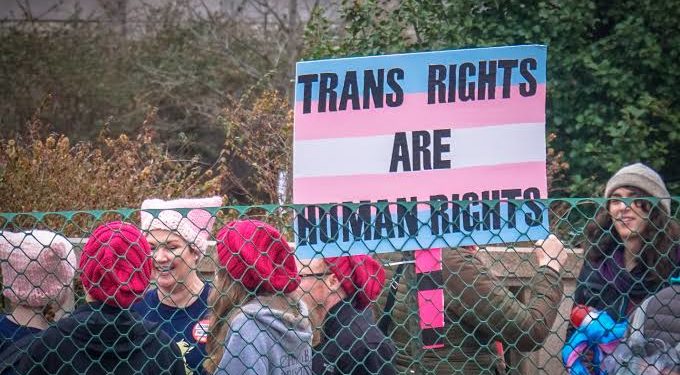Can a trans person file a workplace sexual harassment complaint

Unlike crimes against men, women and children, the Indian government does not publish annual statistics about crimes against transgender people. For decades, transgenders have been looked upon as unnatural elements and forced to take up jobs as beggars and even prostitutes owing to discriminatory hiring practices in India.
History owes an apology to the members of this community and their families, for the delay in providing redressal for the ignominy and ostracism that they have suffered through the centuries. The members of this community were compelled to live a life full of fear of reprisal and persecution. This was on account of the ignorance of the majority to recognise that homosexuality is a completely natural condition, part of a range of human sexuality.
The mis-application of this provision denied them the Fundamental Right to equality guaranteed Article 14. It infringed the Fundamental Right to non-discrimination under Artcile 15 and the Fundamental Right to live a life of dignity and privacy guaranteed by Article 21. The transgender deserves to live a life unshackled from the shadow of being ‘unapprehended felons’ and get equal job opportunities and safe working environment.
Let’s first understand who is a “transgender”?
Transgender is generally described as an umbrella term for persons whose gender identity, gender expression or behavior does not conform to their biological sex. Transgenders may also take in persons who do not identify with their sex assigned at birth and they describe themselves as ―third gender as they do not identify themselves as either male or female.
Transgenders also include persons who intend to undergo Sex Re-Assignment Surgery (SRS) or have undergone SRS to align their biological sex with their gender identity in order to become male or female. They are generally called transsexual persons. Further, there are people who like to crossdress in the clothing of the opposite gender, i.e. transvestites. Resultantly, the term ―transgender, in contemporary usage, has become an umbrella term that is used to describe a wide range of identities and experiences, including but not limited to binary sexes/
Applicability of Sexual Harassment laws on transgenders at the workplace –
Let’s look at if the Sexual Harassment of Women at Workplace (Prevention, Prohibition and Redressal) Act, 2013 (2013 Act), as the 2013 covers “transgender”. The Act clearly states that the law is applicable to women.
Provisions in the Act, however, only recognise the complainant to be an “aggrieved woman” under Section 2(a), thereby excluding transgender persons and precluding the possibility of LGBTQ people being subjects of workplace sexual harassment. Therefore, the POSH act is not applicable to men or transgenders.
However, if a trans person identifies as a woman she will be protected under the POSH Act because then she will fall under the ambit of “aggrieved woman” as defined by the Act. Currently, there are no judicial pronouncements on this position but applying the ranting of new remedies for enforcing one’s rights can be done through the remedial statutes. The purpose of these kinds of statutes is to promote the general welfare of bringing social reforms through the system. These statutes have liberal interpretation and thus, are not interpreted through strict means.
Both by literal interpretation and the golden rule of interpretation of statutes the POSH law will be applicable to trans woman.
Further, Section 354 A of Indian Penal Code states that a man making physical contact and advances involving unwelcome and explicit sexual overtures or demanding sexual favours or making sexually colored remarks, shall be guilty of the offence of sexual harassment.
Department of Social Justice and Empowerment issued the following recommendations, in order to address discrimination and violence against the transgender community, in workplaces:
a) The private sector needs to sensitize employers and employees on issues of transgender persons.
b) Anti-discrimination policies must be instituted and meaningfully applied to the processes of hiring, retention, promotion, and employee benefits.
c) Workplace sexual harassment policies should be made transgender-inclusive.
Onus on Companies for creating a safe working environment for Tarnsgenders
The fact remains that India is home to more than 55 million LGBTQ adults and the country as a whole cannot afford to ignore them anymore, both as individuals, a market and as a talent pool. This is why Transgender Awareness Week is so important. This transgender awareness week lets take positive steps in the sensitization process which will lead to the recognition of members of the transgender community as a part of society and provide them a safe working environment. Ungender can help you draft trans-inclusive policies for your workplace and in conducting training sessions for your team.
Read our insights about diversity, legal updates and industry knowledge on workplace inclusion at Ungender Insights. Visit our Blog.
Sign up to stay up-to-date with our free e-mail newsletter.
The above insights are a product of our learning from our advisory work at Ungender. Our Team specialises in advising workplaces on gender centric laws.
or email us at contact@ungender.in




